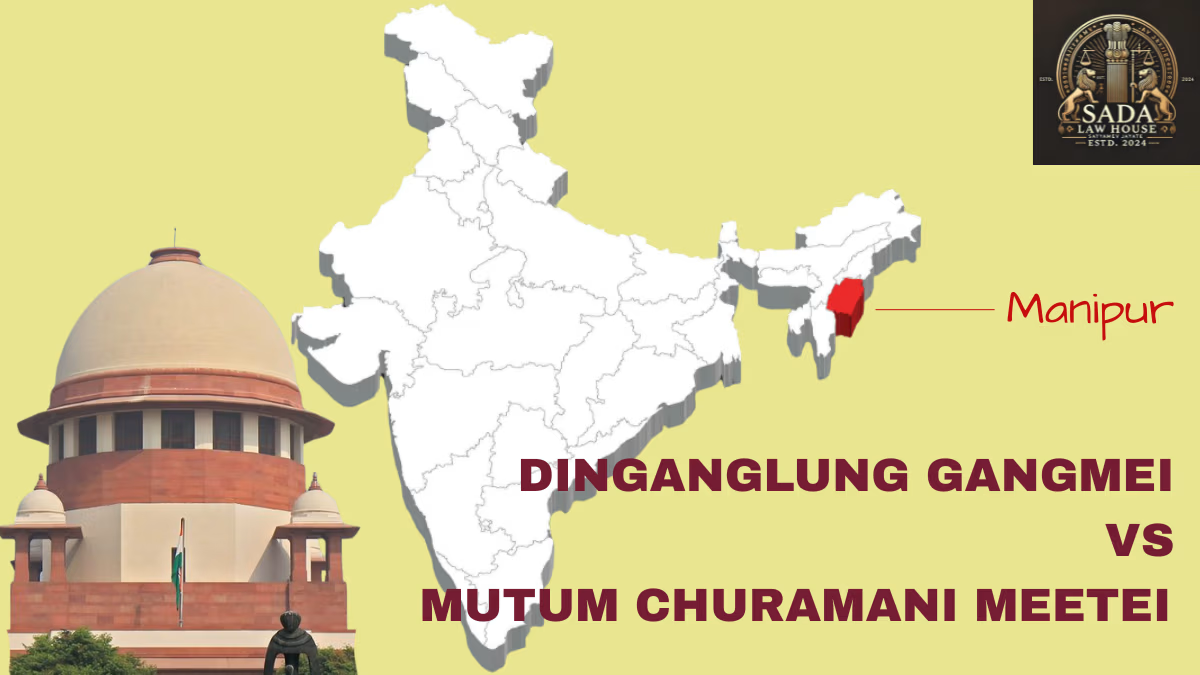Dinganglung Gangmei vs Mutum Churamani Meetei (2023 INSC 698): Supreme Court Oversight in Manipur Ethnic Violence
- PRABHAT KUMAR BILTORIA
- 13 October, 2025

Introduction
A severe humanitarian and constitutional crisis in Manipur prompted an appeal to the Supreme Court of India under Article 32 of the Constitution of India. Following the Manipur High Court’s directive to include the Meitei community in the Scheduled Tribes list, ethnic violence erupted, leading to mass evictions, human rights violations, and targeted attacks on women. The Court was petitioned to ensure the rule of law, accountability, and justice for victims.
Facts of the Case
On March 27, 2023, the Acting Chief Justice of the Manipur High Court recommended the Meitei community for Scheduled Tribe status.
Tribal communities protested, claiming that ST inclusion would weaken their rights, resulting in widespread violence.
Incidents included mass relocation, sexual assaults, murders, and arson.
The Central Government deployed security forces and established relief camps.
Multiple writ petitions under Article 32 highlighted safety, rehabilitation, medical aid, and police inaction.
Supreme Court found the Central and State Governments’ reports largely insufficient.
Issue of the Case
Key Question:
Whether the High Court of Manipur’s ruling on ST inclusion was constitutionally valid, and what steps were required to resolve the humanitarian crisis, uphold the rule of law, and protect fundamental rights, particularly of women?
Judgment
CJI D.Y. Chandrachud emphasized constitutional violations, administrative failures, and the urgent need for structural reform. The Court issued comprehensive directives:
1. Judicial Relief and Rehabilitation Committee
A three-member judicial commission was established:
Former Chief Justice Gita Mittal, Jammu & Kashmir High Court
Justice Shalini Phansalkar Joshi, Former Bombay High Court Judge
Justice Asha Menon, Former Delhi High Court Judge
Committee Mandates:
Monitor survivors’ health, especially women
Supervise relief camps: food, medical care, psychological support, sanitation
Facilitate family reunification, legal aid, and compensation (₹10 lakh for deceased tribal family members)
Establish toll-free helplines and nodal officers
2. CBI Oversight and Investigation
CBI to handle 11 FIRs regarding sexual offences
Officers from Rajasthan, MP, Jharkhand, Odisha, and Delhi, including at least one woman
Former Maharashtra DGP Dattatray Padsalgikar to oversee police and CBI investigations
Investigate alleged police complicity
3. Special Investigation Teams (SITs)
42 SITs across affected districts, with separate teams for sexual violence cases
Officers assigned from outside Manipur for impartiality
SITs to visit relief camps, collect grievances, and ensure FIR registration
4. Guidelines and Standards for Investigation
FIRs must be promptly filed; zero FIRs converted immediately
Medical examinations under Section 164-A CrPC to be conducted swiftly
Witness and victim statements recorded promptly
Police and SITs must follow Supreme Court directives (e.g., Nipun Saxena case)
Ensure legal aid, psychological support, and witness protection
5. Restoring Rule of Law
Identify vulnerable areas and prevent further violence
Publicize SITs and judicial committee roles in camps and communities
Recover stolen weapons
Prepare for trials outside Manipur if necessary
Conclusion
The Supreme Court reaffirmed its constitutional duty to protect equality, dignity, and life, especially for women victims of sexual violence. The judgment underscores transformational justice, highlights systemic failures in law enforcement, and ensures victim-centric relief, rehabilitation, and independent investigations.
The Court emphasized that justice must be swift, fair, and accessible, even amidst public unrest, establishing a historic precedent for judicial and investigative oversight in ethnic violence cases.
Case Laws






